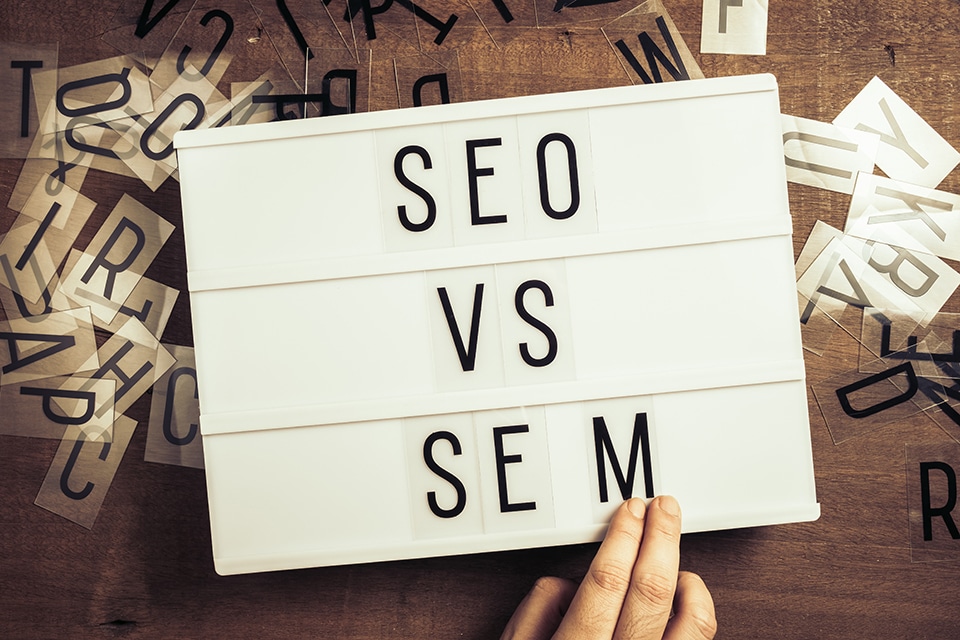
SEO vs SEM
In today’s digital world, businesses must have a strong online presence to succeed. The debate between SEO (Search Engine Optimization) and SEM (Search Engine Marketing) is crucial for those looking to dominate search engine results. These two strategies aim to increase visibility on search engine results pages (SERPs), but they do so in very different ways. Understanding these differences—and the similarities—is essential for maximizing your digital marketing efforts.
What is SEO?
SEO refers to the process of optimizing a website so that it ranks higher on search engine result pages. It is an organic strategy, which means you’re not paying for placement directly. Instead, you’re working to ensure that your website meets the criteria that search engines like Google use to rank websites.
On-Page SEO
On-page SEO focuses on optimizing content and HTML source code on individual pages. This includes using keyword optimization, writing relevant meta descriptions, including alt text for images, and ensuring that the website has a clean structure.
Off-Page SEO
Off-page SEO involves activities that take place outside your website. The most important aspect is backlinking, where other reputable sites link back to your content. A higher number of quality backlinks signals to search engines that your site is trustworthy and authoritative.
Technical SEO
This subset of SEO deals with the technical aspects of a website. Factors like site speed, mobile-friendliness, URL structure, and secure connections (i.e., HTTPS) are essential in technical SEO. Google places a high value on user experience, so addressing these issues can give your site a competitive advantage.
What is SEM?
SEM, on the other hand, involves paying for ads to appear on SERPs. Unlike SEO, which is a long-term, organic strategy, SEM offers instant visibility. SEM typically refers to PPC (Pay-Per-Click) advertising, where you pay search engines to display your website when users search for specific keywords.
PPC Advertising
PPC is the most common form of SEM. When you run a PPC campaign, you bid on specific keywords, and your ad appears at the top or bottom of search engine results. The advantage here is that your website gets immediate visibility, but you pay for every click.
Google Ads
Google Ads is the most popular PPC platform, but SEM also includes other platforms like Bing Ads. SEM strategies allow businesses to target users based on specific criteria like location, demographics, and even device type.
Cost and ROI
While SEM requires a financial investment, it often yields a faster return on investment (ROI) compared to SEO. It’s particularly useful for time-sensitive campaigns, product launches, or seasonal promotions.
Key Differences Between SEO and SEM
Cost
- SEO is free in the sense that you’re not paying for your website to appear in organic listings. However, achieving good SEO results can be resource-intensive, requiring a lot of time, effort, and sometimes even external tools or consultants.
- SEM, meanwhile, requires you to pay for every click. The cost varies depending on how competitive your chosen keywords are, and you need to carefully manage your budget to avoid overspending.
Time
- SEO is a long-term strategy. It can take weeks or even months to see significant improvements in your rankings. However, once your site begins to rank, the results can be sustained with less effort.
- SEM delivers almost instantaneous results. The moment you launch a campaign, your ads can appear on SERPs, making it ideal for businesses looking for immediate visibility.
Sustainability
- SEO is a sustainable strategy. Once you achieve good rankings, maintaining them is relatively easier, although you will need to keep your site updated and your content relevant.
- SEM campaigns, however, stop as soon as you stop paying. The moment your budget is exhausted, your visibility disappears.
Click-Through Rates (CTR)
- Organic listings generally have higher CTRs because users trust organic results more than paid ads.
- PPC ads appear prominently on the page, but users are often wary of clicking on them, especially if they feel they are being “sold” something.
Similarities Between SEO and SEM
Although SEO and SEM are distinct strategies, they share some similarities:
Keyword Research
Both SEO and SEM rely heavily on keyword research. In SEO, the focus is on finding relevant keywords that can be incorporated naturally into the content. In SEM, these keywords are used to target users through paid campaigns.
Data-Driven Decisions
Both strategies rely on analyzing data to make informed decisions. Tools like Google Analytics or SEMrush can help track the performance of SEO efforts, while PPC platforms provide metrics on impressions, clicks, and conversion rates for SEM campaigns.
Improving User Experience
SEO and SEM both aim to deliver the best possible experience to the user. Whether through faster loading times (important for SEO) or highly relevant ad copy (important for SEM), both strategies ultimately aim to serve the user’s needs.
Impact of SEO and SEM on SERPs
Both SEO and SEM significantly impact your site’s visibility on SERPs, but they do so in different ways.
SERP Features
With SEO, your goal is to land in the top organic search results, but you also aim for visibility in SERP features like featured snippets, local packs, and image carousels. These features offer additional opportunities for your site to gain traffic without paying for ads.
In SEM, you’re aiming to appear in the paid ad section of the SERP. Ads are displayed at the top and bottom of the page, and they look similar to organic results, but with a small “Ad” label.
SEO and SEM Synergy
It’s worth noting that these two strategies can complement each other. For instance, an effective SEM campaign can provide immediate traffic and help you gather data on the most effective keywords for your industry. Over time, you can use this information to strengthen your SEO efforts.
Similarly, your SEO work will help lower the cost of your SEM campaigns. When your website has a strong organic presence, search engines view it as more trustworthy, which can lead to lower CPC (Cost-Per-Click) rates in your PPC campaigns.
Which is Right for Your Business?
There is no one-size-fits-all answer to whether SEO or SEM is better for your business. Many companies find that a combination of both strategies yields the best results. For businesses with limited budgets and a need for quick results, SEM may be the way to go initially. However, for long-term growth and sustainability, SEO is a must.
By understanding the differences and similarities between SEO and SEM, you can make an informed decision about which strategy will best serve your business.






